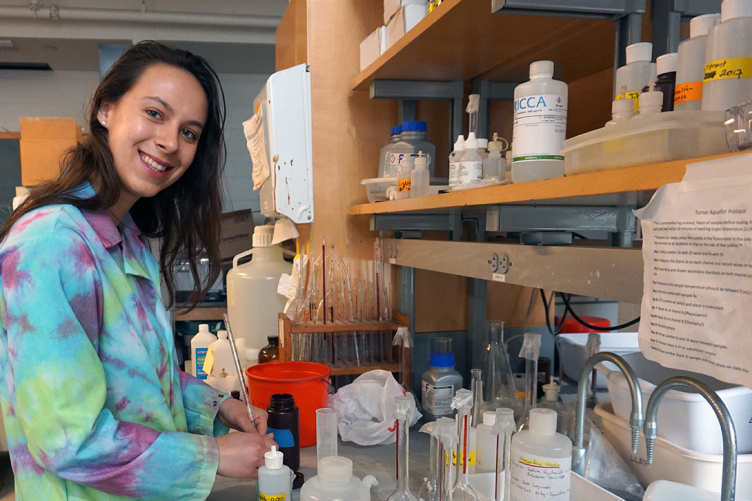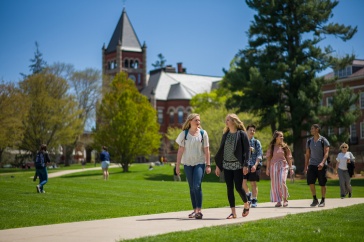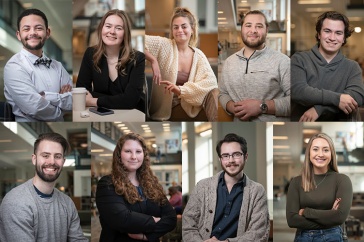
Following graduation, Lucy Spence '18 will be heading to Nicaragua to work with children and adults as an environmental educator for the Peace Corps. In the interview below, Spence, who majored in zoology and minored in Spanish, reflects on her experiences at UNH, success and life outside her comfort zone.
College of Life Sciences and Agriculture: Why did you choose UNH?
Lucy Spence: I chose UNH because of the impressive biological science opportunities on and around campus. I was attracted to a bigger school in a small town with the mountains and the coast so close. It also was not too far from my hometown in Rhode Island.
COLSA: When you arrived on campus, did you know you would be in your current major?
Spence: I originally selected my major in hopes of qualifying for a scholarship from my high school. I wasn’t quite sure what I wanted to do, although I knew it would be in the life sciences field. Although I did not get the scholarship, I did fall head over heels in love with zoology and the only change I made in my major was a switch from a BS to a BA in order to thoroughly study a language as well.
COLSA: Is there an experience or faculty member that has been a great influence? If so, tell us about the experience or person and how it’s impacted you.
"I have succeeded [at UNH] because I stepped out of my comfort zone every day. While that has been challenging, I can now look back at my four years with pride."
Spence: I was greatly impacted by a number of professors. Professor Janet Anderson’s undying passion made me eager to learn about vertebrate morphology and made me excited for my future. My advisor, Dr. Jim Haney, has always been helpful and confident in my abilities. His experience and deep knowledge for the field of limnology astounds me.
As far as an experience that influenced me, my study abroad semester in Costa Rica showed me more of what the world has to offer and has pushed me towards a globally-minded future. Living with a host family and speaking another language every day for four months gave me a lot of confidence.
COLSA: Looking back on your four years at UNH, what are you most proud of and why?
Spence: I am most proud of the wide variety of experiences that I have been able to have here, however long or short they may have been. I currently work as a lake monitoring intern in a lab on campus as well as a supervisor for large events in the Whittemore Center.
I have led backing trips in the White Mountains, I was a coordinator for the PAWs program, I have tutored children through the Seacoast Reads program in reading and writing, I was a community educator with SHARPP, and much more.
On top of these volunteer and work experiences my classes have allowed me to perform microsurgery on embryos, record the effect of classical music on a cow’s response to a novel object, identify birds in the field, dissect cats and sharks, draw blood from horseshoe crabs — just to name some of what I’ve accomplished!
COLSA: You’ll be working for the Peace Corps after you graduate in May as an environmental educator in Nicaragua. Tell us about what you’ll be doing there.
Spence: I will be primarily working in two elementary schools teaching children about the environment and how to protect it. I will also work on educating adults on how to build environmentally friendly stoves and recycle trash into new functioning items. I will be tending gardens and hopefully consuming what I produce in the gardens. There are many other opportunities that are dependent on what site I will be placed in. I hope to be near the coast to do some sea turtle hatchling awareness and observation programs.
The St. Martin Career Exploration Office was exceedingly helpful in my Peace Corps application every step of the way. I am so very thankful for all of the constructive help that the office gave me — from helping me perfect a three-page resume, to writing a succinct essay, to preparing for my interview.
COLSA: What attracted you to the Peace Corps?
Spence: I was attracted to the selfless minimalist culture that the Peace Corps fosters as well as the opportunity to be immersed in a foreign culture. Even when I leave college I want to continue learning in some ways and through the Peace Corps I will learn Spanish and about another culture as well as ways a lot about educating others.
Since I was a teenager, I was certain that the Peace Corps would be a part of my life, but I always assumed that it would be when I was older and had more experiences under my belt. At the end of my fall semester in my final year I realized how much I had learned about the environment, the Spanish language, and myself here at UNH and I knew I was ready to take on the 27 month commitment.
COLSA: Where do you see yourself in 5 years? 10 years?
Spence: In five years, I see myself returning to college back to gain a master’s degree somewhere in the U.S. after getting some hands on experience in a full time job. I believe that a master’s degree in conservation biology would be well suited to me. In 10 years, I hope to be in an educational position at a non-profit or science center. I’d like to work somewhere where I can see animals every day and entice children to learn about science and to become young stewards of the Earth.
COLSA: What advice do you have for students in your major?
Spence: For students in my major I would say take every class that you can. Maybe you don’t need to take developmental biology or ornithology, but when else are you going to be able to learn the hands on skills that those classes teach. It may be extra work or mean adding a fifth class when you don’t need to, but it will not only add items to your resume but also give you fun stories to tell people.
COLSA: What can you tell prospective students who are interested in UNH?
Spence: I can tell prospective students that UNH is great if you seek experiences out. I feel that I have succeeded here because I stepped out of my comfort zone every day. While that has been challenging, I can now look back at my four years with pride at my many accomplishments. I am excited for my future and that is in many ways thanks to UNH.
COLSA: Finally, if you had to use one word to describe your time at UNH, what would it be?
Spence: I would describe my time at UNH as wild.
-
Written By:
Sarah Schaier | College of Life Sciences and Agriculture


















































